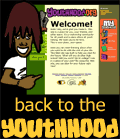Your Role as Youthhood Guide
The role of the Youthhood Guide (you may be a teacher, mentor, guidance counselor, or parent, for instance) is vital in supporting youth as they experience the Youthhood Web site. Research supports the idea that contact with caring adults is the number one requirement for teens’ healthy development. Supporting youth by using The Youthhood as part of a school curriculum, community, or home activity includes understanding and using these essential tips for the success and well-being of youth.
It is our hope that The Youthhood be seen as more than a curriculum for teachers and adults, more than an activity for youth workers, and more than a Web site for families and youth. We envision all adults becoming caring mentors, engaged in the circle of support that all youth need. Helping all youth to access and use what The Youthhood has to offer can help make this a reality.
Suggest Online Journaling
One of the interactive features youth can use in The Youthhood is a private journal. Youth can utilize the journal to deal with their feelings about the things they are learning, to reflect upon goals, dreams, and fears or just as a way to let off steam about daily challenges in life. Youth can decide to share or not share their journal entries with adults. They may write things about drug use, sexual activity, anger, depression, or teasing and bullying experiences. If youth choose to share their Private Journal entries with their with you as their Youthhood Guide, you should be aware that it is your responsibility to respond in a healthy, caring, and responsible way.
Develop a Circle of Support
As a Youthhood Guide, it’s important to develop a professional circle of support that includes other adults working with teens. This circle can help you to generate ideas about how to deal with professional-client boundaries, how to positively support youth and yet disagree with their behavior, and how to build trust if a report must be made regarding abuse, substance abuse, illegal sexual activity, or suicidal thoughts.
Adults working with youth need to be comfortable with the emotions and information that teens may share as they work their way through the site. An example might be a teen sharing an abuse experience with their adult mentor or group. Questions that would need to be asked and acted upon include:
- How should this be handled?
- Who needs to know about the abuse?
- Are mentors mandated reporters?
- Who are the local counselors that can be included in this teen’s circle of support?
In addition to developing a professional circle of support, we strongly suggest that you collect information related to reporting abuse, drug use, and other situations in which an adult is responsible for a reporting a minor’s behavior from both your school policies as well as at the state level.
Address Cultural Issues
Although The Youthhood was developed from a culturally sensitive and culturally respectful point of view, there may be some activities that teens from specific cultures may not want to participate in or that differ from their values. Learning and building upon the values and cultures of each teen will help Guides understand and work within that framework.
Consider the composition of the youth you're working with and try to ensure you address issues related to each individual’s culture, gender, class, race, ethnicity, disability, etc.
|















